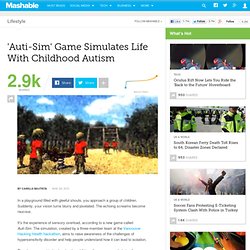

'Auti-Sim' Game Simulates Life With Childhood Autism. In a playground filled with gleeful shouts, you approach a group of children.

Suddenly, your vision turns blurry and pixelated. The echoing screams become raucous. It's the experience of sensory overload, according to a new game called Auti-Sim. The simulation, created by a three-member team at the Vancouver Hacking Health hackathon, aims to raise awareness of the challenges of hypersensitivity disorder and help people understand how it can lead to isolation. The closer you get to loud and active children, the more overwhelming the situation becomes. Taylan Kadayifcioglu (who goes by Taylan Kay), one of the game's programmers, says he was inspired by an excerpt from a documentary called Inside Autism. "It was striking how an ordinary, everyday environment could pose significant challenges," Kay tells Mashable.
"It was striking how an ordinary, everyday environment could pose significant challenges," Kay tells Mashable. Screenshot courtesy of YouTube, Taylan Kay. The Inclusive Class: 10 Easy Changes Teachers Can Make to Facilitate Inclusion. "Over, under, around or through find a way, or make a way" is a quote by Paula Kluth that recently reminded me of how I found ways to include all my students in a classroom activity, regardless of their ability level.

While I am speaking with Dr. Cheryl M. Jorgensen about this topic on an upcoming podcast, I wanted to share one of the most successful ways that I used as a classroom teacher to facilitate inclusion. In order to have students aquire the same learning experiences, teachers have to be prepared for the differences in their student's abilities and learning styles. This technique is known as "differentiation". Here are 10 easy changes teachers can make to facilitate inclusion: r Time - change the time of day the activity is planned for, the duration of activity, the time of week or even the month. r Method – change how the lesson is delivered. R Product – change the assignment from writing to drawing, art, music, or drama. R Teacher – yes, change the teacher! The Inclusive Class: Top 10 Websites for the Inclusive Classroom. Teachers love a great resource!

Especially a resource that is free and at their fingertips - literally. That's why I put together a list of 10 outstanding websites that teachers can use in the inclusive classroom (or any classroom, for that matter!). Why I Fought For Inclusion. Every year that I attend the National Inclusion Project’s Champions Gala, I leave with so many emotions.

I can always guarantee someone, or something, will bring me to tears and this year was no exception. Being the mother of a son with a disability, I relate to many many things said or shown at the Gala and every year there seems to be one moment that gets to me more than others. This year it came towards the end when Aron Hall, Director of Programs was speaking. He was talking about all the negative things we hear about our kids.
Oh, did I ever live that.
The Inclusive Class: Helpful On-Line Resources for Creating Inclusive Schools. International Down Syndrome Coalition- IDSC: IDSC 2013 World Down Syndrome Day Video Release. We are so excited to share with you the 2013 IDSC World Down Syndrome Day video.

Individuals with Down syndrome are more than their diagnosis. This year's video introduces you to many people, and invites you to find out who they are! If after watching the video, you find you are interested in purchasing it, it is available in our new IDSC Store for $9.99, or you can buy 3 for $21, by purchasing it at our 3 for 21 special rate! Without further adieu we give you the 2013 IDSC World Down Syndrome Video. A special thank you to Sarah Conant for allowing us to use her song Who I Am for this year's Who I Am campaign. Another very special thank you to Katie Kalsi for creating the strap that was the inspiration for the designs for the entire Who I Am campaign. Girl Creatively Explains Autism.
The Inclusive Class: 25 Easy Ways to Improve Executive Functioning Skills. How do we help our children or students who are perpetually losing things, often running late and seem completely disorganized?

Do we reprimand them for being lazy? Do we keep them in at recess because they forgot to do their homework? Do we let our frustration and angst get the better of us and completely give up on helping them with anything at all? Or, do we wonder if there is a reason as to why this child just can't seem to pull things together? Instead of labeling the child or student as lazy, forgetful and inattentive, consider that perhaps they are struggling due to weak executive functioning skills. Teachers and parents often spend an inordinate amount of time supporting children with weak executive function skills. However, in a carefully planned and organized school day, there are 25 easy ways for teachers and parents to help strengthen weak executive functioning skills in kids: 1. 2. 3. 4. 5. 6. 7. 8. 9.